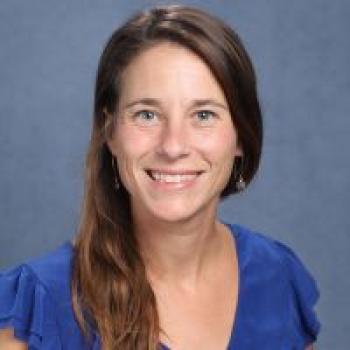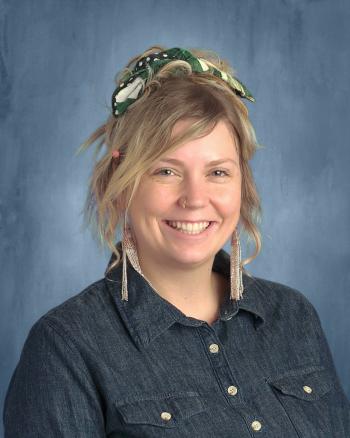Leading by Example: Instructors Showcase Leadership Inside and Outside of the Classroom
By Ed Finkel
Kat Bryant teaches middle school math at St. Stephen’s and St. Agnes School in Alexandria, Virginia. Karen Kelly teaches visual arts at J.O. Wilson Elementary School in the District of Columbia Public Schools.
Though they teach different subjects in different communities, their worlds intersect as instructors in the leadership and service-learning programs offered to middle-and high-school students through CTD’s Civic Education Project (CEP). Coincidentally, their own learning experiences also will intersect with upcoming (but separate) Fulbright scholarships that will take them to Morocco.
Founded in 1997, CEP provides several different school-year and summer in-person programs and online courses, including the 3-week summer Civic Leadership Institute and the online Leadership Intensives. Bryant connected with CEP when she first started classroom teaching about a decade ago.
 She’s served as the operations coordinator for in-person programming and, for the last couple of years, as academic coordinator for online programming. With a background in international development—she has done volunteer work in several countries—Bryant did not formally train to be a teacher.
She’s served as the operations coordinator for in-person programming and, for the last couple of years, as academic coordinator for online programming. With a background in international development—she has done volunteer work in several countries—Bryant did not formally train to be a teacher.
“I feel like, in a way, I kind of grew up in this [CEP] programming,” she says. “It really taught me how to be a classroom teacher, and the value of field education and authentic experiences for more meaningful learning. So much of what I’ve learned through the curriculum that they’ve developed, I’ve been able to take back into my classroom.…Having served in more program management roles has been a really special opportunity for me to get to work with other instructors and in their classrooms and learn from them.”
Bryant figures that after a decade, at least part of what she contributes to CEP is her institutional memory about the program and its traditions. “I hope that’s an asset,” she says. “And just my enthusiasm, I think, for the programming itself. … It’s a really special experience to work with students who are opting into these courses. They really want to be there. And it’s just fabulous to be able to teach things and to facilitate activities that you care about.”
Kelly found out about CTD while serving as an online instructor for the Center for Talented Youth, which had a previous collaboration with CEP. She says CEP is very similar, except “much more focused on civic education and social justice, which is definitely what I’m interested in. What I really have enjoyed about the [program] is, I was able to write the curriculum for some of the classes, like Women in Leadership, and Arts and Activism…“I loved being able to write that curriculum, and teach that course, because it bridged my love for social justice and activism with my passion for art education,” she adds. “Being able to combine those two passions was a really great opportunity. And at the time, I was working on my doctorate in curriculum and instruction, so it was amazing to have an opportunity to practice curriculum writing. Because you don’t always get those opportunities in public education—a lot of the curriculum is sort of given to you.”
 When Kelly taught Women in Leadership, one cohort included about nine girls from Saudi Arabia, China, and at least one other foreign country in addition to several from various locales throughout the U.S. “They were opting in, and they were invested in talking about this,” she says. “We got their viewpoints from so many different cultures and experiences.”
When Kelly taught Women in Leadership, one cohort included about nine girls from Saudi Arabia, China, and at least one other foreign country in addition to several from various locales throughout the U.S. “They were opting in, and they were invested in talking about this,” she says. “We got their viewpoints from so many different cultures and experiences.”
Bryant helped to develop a course called Raise Your Voice, which covers strategic communications, and she also helped to develop a course on climate justice. Students often start with a “101” course called Leadership for Today, although it’s not required, she notes. “And then the other courses are all more specific to arts and activism, or the environment, or social entrepreneurship, or technology,” she says.
Bryant appreciates the real-time feedback she gets from students after each session. “That is a really great way to practice emergent curriculum, and to tailor and customize it to students’ interests that you have in that particular class,” she says. “Which you don’t necessarily get the opportunity to do in the regular classroom.”
CEP focuses on meeting young leaders where they are, building inclusive and vibrant class communities, honing skills that students can apply to real-life scenarios, using facts and data to bolster critical inquiry, and encouraging students to take action with the guidance of skilled teacher facilitators. Linsey Crowninshield, CEP, coordinator, says the program and its over 16 course topics bring together students’ interests, current issues, and effective practices.
Crowninshield says she taps younger leaders with an array of experiences as instructors and guest speakers “so they can be relatable role models for these students who reinforce the idea that you can do this as a young person.” Many instructors have taught multiple courses in the program, she says, and “they may have students more than once.”
Staff like Bryant and Kelly continue to grow as leaders, community members and teachers along with their students, Crowninshield says. “Our programs are rooted in thinking about your community and your impact, how you can be a strong citizen, friend and classmate,” she says. “The longevity of our staff is similar to the longevity of how many students come back to these classrooms. The staff are attracted to building relationships with young leaders and building their skill sets as citizens and educators and people in careers.” As instructors continue to accumulate experiences outside of the CEP classroom they bring their own learning back, showing their students the lifelong trajectory of career and leadership development.
Both Kelly and Bryant have vibrant careers as educators beyond what they do at CTD and have traveled extensively. And as mentioned earlier, Kelly will travel to Morocco to examine arts integration in schools with a Fulbright scholarship as part of the Teachers for Global Classrooms program, while Bryant will also travel to Morocco on a Fulbright scholarship next year, after receiving a grant to research civic engagement and youth employability post-2011.
When instructors bring these experiences back to CTD along with everything else they have accomplished and experienced, they are met by curious, thoughtful students eager to engage in dialogue and perspective taking. “I just want to commend CEP, again, because I think it's an incredible program,” Bryant says. “Something that I really appreciate about it is, you tend to get students who have done CTD programming for years, and they are some of the most intellectually curious, highly motivated students. And it's so cool to see them be in a class where they're asked to use their learning and their skills to solve real-world problems. That's, hands down, what I think is the selling point for this program.”

